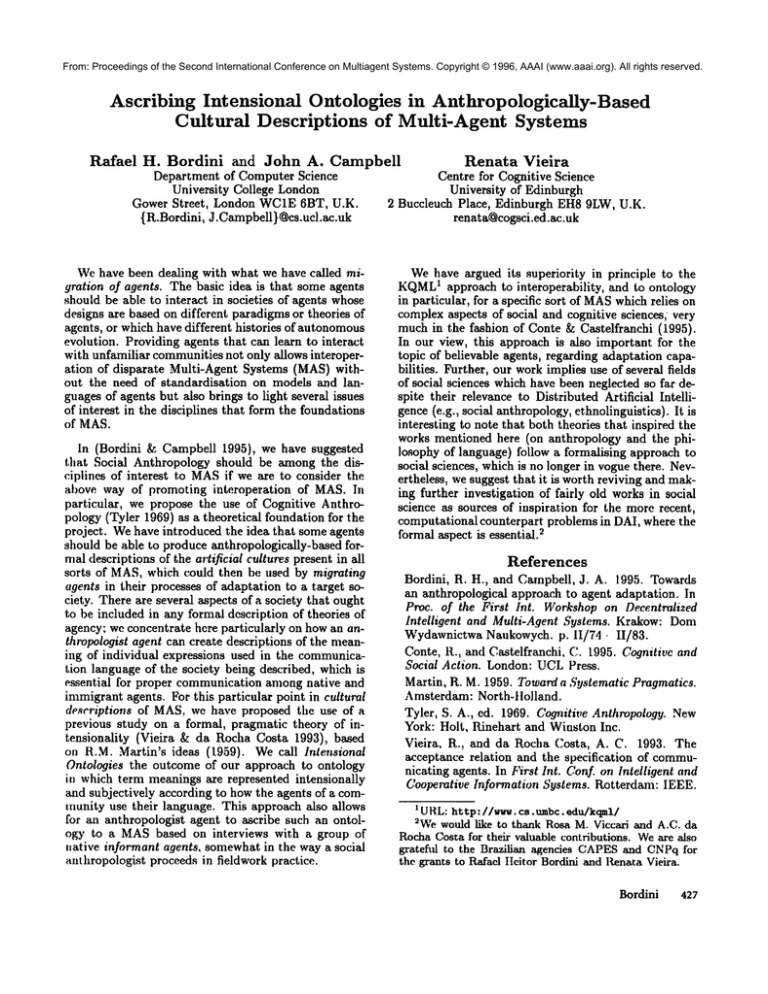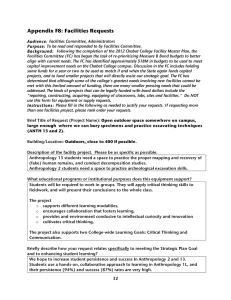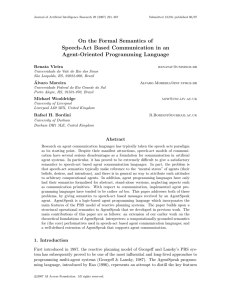
From: Proceedings of the Second International Conference on Multiagent Systems. Copyright © 1996, AAAI (www.aaai.org). All rights reserved.
Ascribing Intensional Ontologies in Anthropologically-Based
Cultural Descriptions
of Multi-Agent Systems
Rafael
H. Bordini
and John A. Campbell
Department of Computer Science
University College London
Gower Street, London WC1E6BT, U.K.
{R.Bordini, J.Campbell}@cs.ucl.ac.uk
Wehave been dealing with what we have called migration of agents. The basic idea is that some agents
should be able to interact in societies of agents whose
designs axe based on different paradigms or theories of
agents, or which have different histories of autonomous
evolution. Providing agents that can learn to interact
with unfamiliar communities not only allows interoperation of disparate Multi-Agent Systems (MAS) without the need of standardisation on models and laxiguages of agents but also brings to light several issues
of interest in the disciplines that form the foundations
of MAS.
In (Bordini & Campbell 1995), we have suggested
that Social Anthropology should be among the disciplines of interest to MASif we are to consider the
above way of promoting interoperation
of MAS. In
particular,
we propose the use of Cognitive Anthropology (Tyler 1969) as a theoretical foundation for the
project. Wehave introduced the idea that some agents
should be able to produce anthropologically-based forrnal descriptions of the artificial cultures present in all
sorts of MAS,which could then be used by migrating
agents in their processes of adaptation to a target society. There are several aspects of a society that ought
to be included in any formal description of theories of
agency; we concentrate hcre particularly on howan anthropologist agent can create descriptions of the meaning of individual expressions used in the communication language of the society being described, which is
essential for proper communication anmng native and
immigrant agents. For this particular point in cultural
descriptions of MAS,we have proposed the use of a
previous study on a formal, pragmatic theory of intensionality (Vieira & da Rocha Costa 1993), based
on R.M. Martin’s ideas (1959). Wecall lntensional
Ontologies the outcome of our approach to ontology
in which term meanings are represented intensionally
and subjectively according to howthe agents of a comtnunity use their language. This approach also allows
for an anthropologist agent to ascribe such an ontology to a MASbased on interviews with a group of
native informant agents, somewhatin the way a social
anthropologist proceeds in fieldwork practice.
Renata Vieira
Centre for Cognitive Science
University of Edinburgh
2 Buccleuch Place, Edinburgh EH8 9LW, U.K.
renal a@cogsci.ed.ac.uk
Wehave argued its superiority in principle to the
1 approach to interoperability,
KQML
and to ontology
in particular, for a specific sort of MASwhich relies on
complex aspects of social and cognitive sciences, very
much in the fashion of Conte & Castelfranchi (1995).
In our view, this approach is also important for the
topic of believable agents, regarding adaptation capabilities. Further, our work implies use of several fields
of social sciences which have been neglected so far despite their relevance to Distributed Artificial Intelligence (e.g., social anthropology, ethnolinguistics). It
interesting to note that both theories that inspired the
works mentioned here (on anthropology and the philosophy of language) follow a formalising approach to
social sciences, which is no longer in vogue there. Nevertheless, we suggest that it is worth reviving and making further investigation of fairly old works in social
science as sources of inspiration for the more recent,
computational counterpart problems in DAI, where the
2formal aspect is essential.
References
Bordini, R. H., and Campbell, J. A. 1995. Towards
an anthropological approach to agent adaptation. In
Proc. of the First Int. Workshop on Decentralized
Intelligent
and Multi-Agent Systems. Krakow: Dora
WydawnictwaNankowych. p. 11/74 - 11/83.
Conte, R., and Castelfranchi, C. 1995. Cognitivc and
Social Action. London: UCLPress.
Martin, R. M. 1959. Toward a Systematic Pragmatics.
Amsterdam: North-llolland.
Tyler, S. A., ed. 1969. Cognitive Anthropology. New
York: Holt, Rinehart and Winston Inc.
Vieira, R.., and da Rocha Costa, A. C. 1993. The
acceptance relation and the specification of communicating agents. In [’~rst Int. Conf. on Intelligent and
Cooperative Information Systems. Rotterdam: IEEE.
1U RL:http://www,cs. tmbc. edu/kqml/
2r~Ve wouldlike to thank Rosa M. Viccari and A.C. da
RochaCosta for their valuable contributions. Weare also
grateful to the Brazilian agencies CAPESand CNPqfor
the grants to Rafacl IIcitor Bordini and RenataVieira.
Bordini
427






